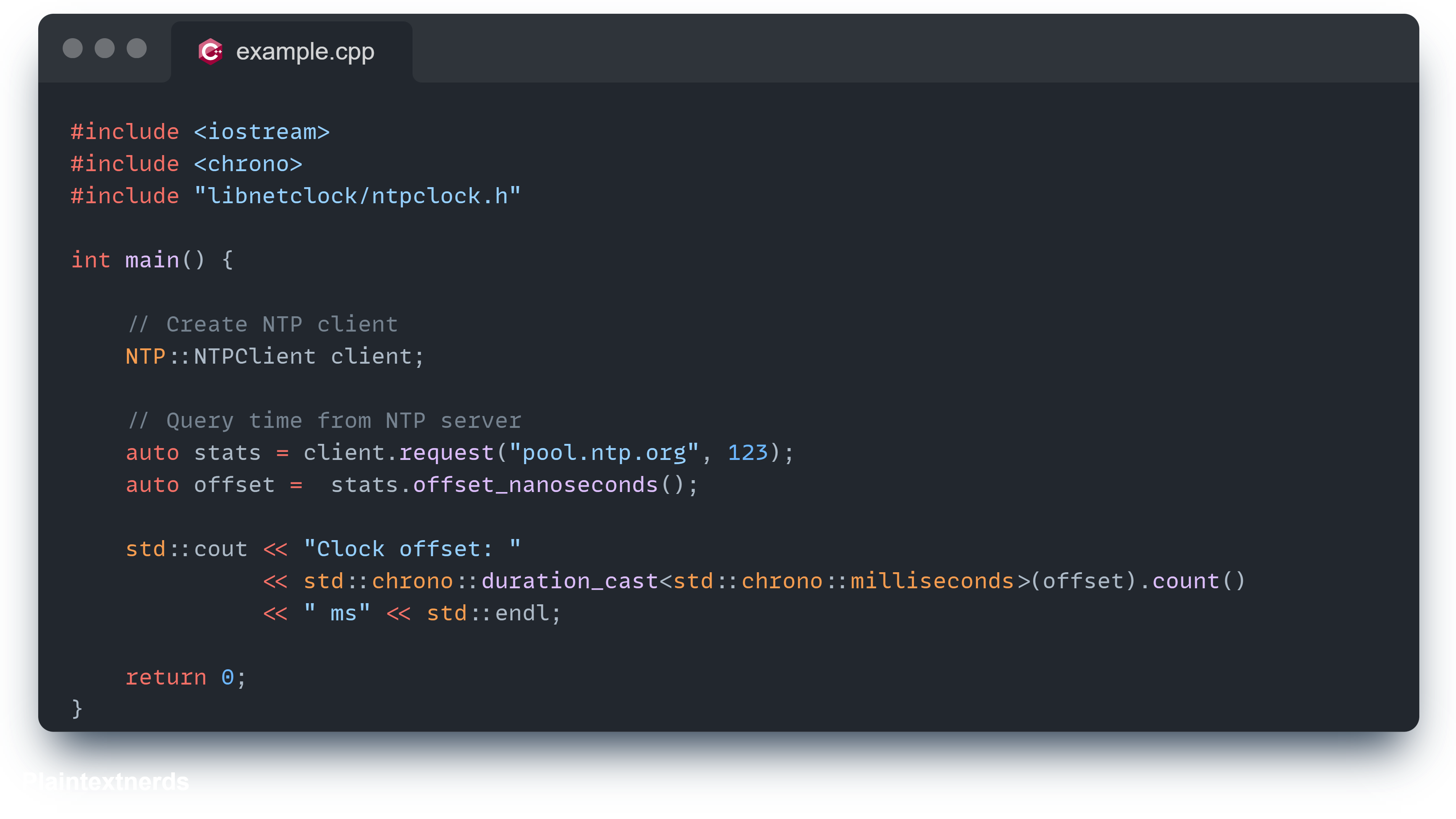libnetclock
About
libnetclock is a lightweight, modern C++ library that provides Network Time Protocol (NTP) client functionality with seamless integration into the standard std::chrono ecosystem.
Designed for applications requiring precise time synchronization, it offers microsecond-level accuracy while maintaining a clean, type-safe API.

Key Features
- std::chrono Integration: Native support for
std::chrono::time_pointand duration types - High Precision: Microsecond-level timestamp accuracy with sub-millisecond network compensation
- Easy Integration: Clean CMake integration with pkg-config support
- Cross-Platform: Compatible with Linux, Windows, and macOS
- NTP v4 Compliant: RFC5905 compliance
- Thread-Safe: Designed for concurrent access and multi-threaded applications
- Network Diagnostics: Built-in round-trip time measurement and jitter analysis
- Modern C++: Leverages C++17 features for clean, efficient code
Requirements
- Compiler: C++17 compatible compiler (GCC 7+, Clang 5+, MSVC 2017+)
- Platforms: Linux, Windows, macOS
- Build System: CMake 3.19+
- Dependencies: Boost libraries (system, asio)
Performance Characteristics
libnetclock is designed for high performance and low latency:
- Query Time: Typically 1-50ms depending on network conditions
- Memory Usage: ~12KB per NTPClient instance
- Binary Size: ~150KB static library, ~80KB shared library
- CPU Overhead: Minimal, leverages Boost’s efficient networking
- Accuracy: Sub-millisecond precision under good network conditions
Benchmark Results
Platform: Linux x64, GCC 11.2, Boost 1.74+
Network: Gigabit Ethernet, <1ms to NTP server
Single Query: ~2ms average
Batch 100 Queries: ~150ms total
Memory per Client: 11.5KB
Binary Size: 145KB (static, excluding Boost)
CPU Usage: <0.1% during queries
Thread Safety
libnetclock is designed to be thread-safe:
- NTPClient: Thread-safe for concurrent queries
- NTPStats: Immutable after construction
Comparison with Alternatives
| Feature | libnetclock | chrony |
|---|---|---|
| Language | C++ | C |
| std::chrono Support | ✅ Native | ❌ |
| Easy Integration | ✅ CMake | ⚠️ System |
| Dependencies | Boost | Many |
| Precision | μs | ns |
| Cross-platform | ✅ | ✅ |
| Binary Size | 150KB+ | 500KB+ |
FAQ
Q: How accurate is libnetclock compared to system NTP daemons?
A: libnetclock achieves microsecond-level accuracy under good network conditions. While dedicated NTP daemons like chronyd can achieve nanosecond precision with specialized hardware, libnetclock is ideal for applications requiring precise time without system-level dependencies.
Q: Can I use libnetclock to set the system clock?
A: libnetclock is designed for time measurement and synchronization within applications, not system clock adjustment. For system-level time setting, use dedicated tools like ntpdate or chrony.
Q: Does libnetclock work behind firewalls?
A: Yes, libnetclock uses UDP port 123 (standard NTP port). Ensure your firewall allows outbound UDP traffic on this port.
Q: Is libnetclock suitable for high-frequency trading applications?
A: libnetclock provides excellent precision for most applications. For ultra-low latency requirements, consider hardware-based solutions or kernel-bypass networking.
Dependencies
License
libnetclock is licensed under the MIT license.
A copy of this license has been provided in the file LICENSE.
For a helpful summary of the license check out: https://choosealicense.com/licenses/mit/
Support
This is a free library licensed under the MIT license, if you notice a bug or have a feature request please raise a ticket in GitLab, and we’ll do our best to support you. If you need priority support or wish to fast-track a feature request, you’re welcome to engage us to answer your request.
Tags
#ntp #datetime #netclock #chrony #cplusplus #cpp #performance #calibration #time #clock #OpenSource
